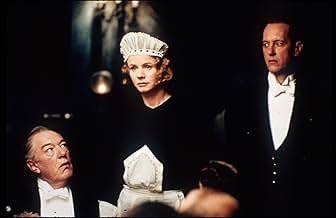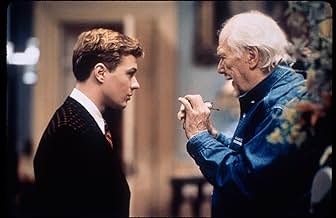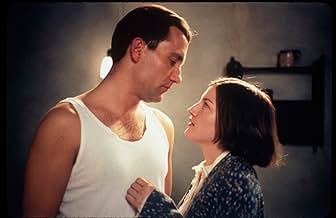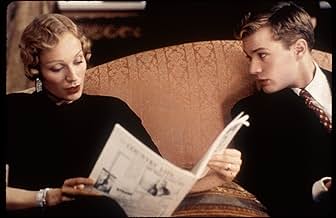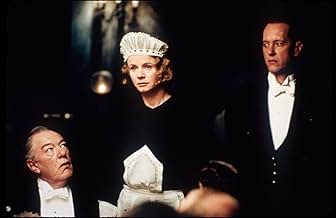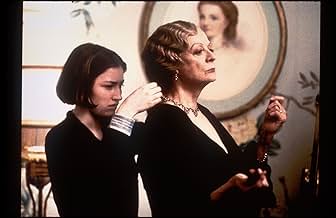Gosford Park
- 2001
- Tous publics
- 2h 17min
La vie des invités logeant à l'étage et des domestiques au rez-de-chaussée lors d'une fête en 1932 dans une maison de campagne en Angleterre alors qu'ils enquêtent sur le meurtre de l'un d'e... Tout lireLa vie des invités logeant à l'étage et des domestiques au rez-de-chaussée lors d'une fête en 1932 dans une maison de campagne en Angleterre alors qu'ils enquêtent sur le meurtre de l'un d'entre eux.La vie des invités logeant à l'étage et des domestiques au rez-de-chaussée lors d'une fête en 1932 dans une maison de campagne en Angleterre alors qu'ils enquêtent sur le meurtre de l'un d'entre eux.
- Réalisation
- Scénario
- Casting principal
- Récompensé par 1 Oscar
- 36 victoires et 74 nominations au total
Avis à la une
Another thing that I want to say about this film, is that after having seen Black Hawk Down a couple of days ago, this movie is as much a technically visual masterpiece as the Ridley Scott film. The use of foreground and background is simply amazing. The choreography and blocking of the movement is perfect. Is it rigid? Yup. And that's the point.
It's a shame that movies like this are refered to as boring and stiff. One reviewer suggested that it would work as a thirty minute short as opposed to a nearly two and half hour long movie. That seems like a ridiculous notion to me because then all it would have been a murder mystery as opposed to what a wonderfully filmed character drama.
And hey, I didn't remember a single name either. Maybe people who have criticized this movie for that should look back and see how many movies they remember all the names of all the characters upon the first viewing. My thought is that most of the names are inconsequential anyhow.
GOSFORD PARK is an English Murder Mystery, set in the 1920's, featuring an All Star Cast, Directed by a 7 time Oscar nominee. It received critical acclaim in the year it was released (2001), earned 7 Oscar nominations (including Best Picture) and won the Oscar for Best Original Screenplay (Julian Fellowes...who would go on to create/write DOWNTON ABBEY).
Set in an English Country Manor, overseen by overbearing Lord William McCordle (Michael Gambon, the 2nd Albus Dumbledore in the Harry Potter films), GOSFORD PARK tells of the trials, tribulations, loves and death (yes, there's a murder) of a host of characters both Upstairs (the wealthy) and Downstairs (the servants).
And what a cast it is! Kristin Scott Thomas, Maggie Smith, Charles Dance, Jeremy Northam, Tom Hollander and Bob Balaban lead the group of the wealthy, while Helen Mirren, Alan Bates, Clive Owen, Kelly MacDonald, Eileen Atkins and Emily Watson head up the cast of servants below the stairs.
Both Maggie Smith and Helen Mirren were nominated for an Oscar for Best Supporting Actress for their work in this film (both losing to Jennifer Connelly for A BEAUTIFUL MIND).
Directed by Robert Altman (M*A*S*H, NASHVILLE), GOSFORD PARK is much of what you would expect from an Altman film...many, many people living their lives, sometimes intersecting with others, often times just going off on their own, tied together by the circumstances of being in this giant manor house on a weekend of a murder.
It is an ambitious, "Oscar bait" film that succeeds for the most part. And, if you are into the costumes, sets, Interior Design and intimate scenes of people talking, then you will be richly rewarded by this film.
I loved this film when it first came out and was anxiously looking forward to re-visiting it.
While I still liked it during this viewing, I did find the pacing to be languid and I started finding myself being frustrated by threads and character direction that just sort of petered out or ended all together with no real resolution. I know this was on purpose, for Altman would argue that this is what happens in real life, but I found this frustrating.
But this film has much, much going for it and if you haven't seen this - or haven't seen this in awhile - and are a fan of these types of films, then GOSFORD PARK will be a very rewarding 2 hours and 11 minutes of a movie going experience.
Letter Grade: B
7 stars (out of 10) and you can take that to the Bank (ofMarquis)
Altman's preferences for kaleidoscopic social observation has sometimes failed in the past due to the weight of its own ambition: multi-plotted and multi-charactered snapshots of time and place held together by loose ties or a general thematic framework. Sometimes it pays off spectacularly (Nashville); sometimes it flatters to deceive (Short Cuts).
It works well here due to the necessary discipline of the single location and the greater opportunities for interaction among the characters this affords. Add to that an exemplary cast of (mostly) British character actors and a knowing script by Julian Fellowes that gives Altman's keenly observant camera plenty of time to make its own points.
Rightly, Altman is less concerned with the murder mystery, which is almost an aside, than with the opportunity given by a shooting party at a 1930s stately mansion to observe the English aristocracy and their servants in social interaction.
Never happier than when involved in a bit of human anthropology, Altman lightly dissects the complexities and hierarchies which go on both above and below stairs; in which many subtle and unsubtle rituals are played out among groups of people who clearly dislike each other but are forced through circumstance, need or employment to observe the fundamental social practices required.
1932 is also a time of intruding change into the nature of the old English ruling classes, slowly disintegrating in this between-wars period and, in this case, largely reliant on the wealth of one particularly reluctant patron to keep them in furs and flunkies. In on this act comes the (to them) faintly odious whiff of 20th century new money, represented by Hollywood and popular culture. These intruders are kept in their place, but the message is clear - change is coming, and coming fast.
The muted colours and autumnal setting continue this theme of a world in terminal decline and of a group of characters keenly conscious of place and tradition yet also wearied and exhausted by it. Only at the very end, when fundamental change has occurred and many characters are left to face up to very different destinies do we see a bit of sunshine creeping in, heralding the dawn of a new era.
The cast are all excellent, with special mention deserving of Maggie Smith's effortless scene stealing as a bitchy but broke old Countess; the ever reliable Jeremy Northam as matinee idol Ivor Novello, well aware of his place in the great scheme of things and young Kelly Macdonald in the pivotal role of Smith's harassed maid who's inquisitiveness rattles a whole load of family skeletons.
What was surprising was the level of humour that Altman brings to what is, as it unfolds, a very sad story of transgression and loss. Maggie Smith has all the funniest lines as a viscious but impoverished woman who comes to her family with begging cap in hand. Those playing characters "above stairs" all look and sound the part and effortlessly give the impression of wealth and privelege and the callousness that breeds.
Many of the "downstairs" characters drive the story and there are some wonderfully wry performances from the likes of Richard E Grant and Alan Bates. As the moral centre of the film, Kelly McDonald is excellent and is well matched by Emily Watson as Emily and Clive Owen as Parkes. Ruling the downstairs troop is Helen Mirren whose cool visage hides a seething mass of emotion. A well deserved nomination here.
Only Robert Altman could assemble a cast of this magnitude and distinction and have many of them speak no more than a few lines ! Greats of English theatre like Derek Jacobi have small but memorable roles and there is not a bad note struck from any of the predominantly English cast.
I was slightly puzzled by the character played by Ryan Phillipe (although his perforamce was fine) but felt that the intrusion of two Americans into this English mix worked well to highlight the entrenched class roles played by everyone in the house.
Whilst perhaps not his best work, this is a very good Altman film - we move in and out of conversations whilst never losing their import and the cimematography has a fluidity that few other film makers can match.
A classy piece of film-making that rewards careful attention from the viewer.
The film admittedly stinks as a murder mystery---it's almost funny how little Altman himself seems interested in the who-dunnit. But, typically for Altman, it's the deconstruction of the genre that he's interested in, not the genre itself. This movie isn't about a murder in a country house; it's a movie about class differences and people connecting (or not connecting) with one another.
It seems futile to mention stand out performances in a film filled to the rafters with stand-out performances, but I did especially like Emily Watson as a cheeky maid, Helen Mirren as the "perfect servant," and Kelly MacDonald as the novice lady's attendant who grows more than anyone else over the course of the film.
The film is at its best when it's probing the emotional depths of the story---it comes across as a bit too glib when the satire gets especially acidic (mostly with the Kristin Scott Thomas character), but like the best of his movies ("Nashville," "M*A*S*H," "Short Cuts") Altman knows how to control his own cynicism and doesn't let sarcasm rule.
With his on again-off again track record, we can expect the next Altman film to tank, so let's enjoy this one while we can.
Le saviez-vous
- AnecdotesThe camera is always moving (if only slightly) in every shot as requested by producer and director Robert Altman.
- GaffesThe movie takes place in 1932 but some of the songs Ivor Novello sings for the guests didn't come out until years after, like "Glamorous Night" (1935), "Why It Wasn't You" (1937), "I Can Give You a Starlight" (1939) and "Waltz of My Heart" (1939).
- Citations
[Morris Weissman is asked about his upcoming movie project]
Lady Sylvia McCordle: Mr Weissman.
Morris Weissman: Yes?
Lady Sylvia McCordle: Tell us about the film you're going to make.
Morris Weissman: Oh, sure. It's called "Charlie Chan In London". It's a detective story.
Mabel Nesbitt: Set in London?
Morris Weissman: Well, not really. Most of it takes place at a shooting party in a country house. Sort of like this one, actually. Murder in the middle of the night, a lot of guests for the weekend, everyone's a suspect. You know, that sort of thing.
Constance: How horrid. And who turns out to have done it?
Morris Weissman: Oh, I couldn't tell you that. It would spoil it for you.
Constance: Oh, but none of us will see it.
- Crédits fousThe cast credits at the end are separated between above stairs, visitors and below stairs, arguably listed in order of status within the British class system.
- ConnexionsFeatured in Siskel & Ebert & the Movies: The Best Films of 2001 (2001)
- Bandes originalesWaltz of My Heart
Performed by Christopher Northam
Composed by Ivor Novello & Christopher Hassall (as Christopher V. Hassall)
© Chappell/Music Limited
By Kind Permission of Warner/Chappell Music Ltd
Meilleurs choix
Détails
- Date de sortie
- Pays d’origine
- Site officiel
- Langues
- Aussi connu sous le nom de
- Muerte a la media noche
- Lieux de tournage
- Syon House, Syon Park, Brentford, Middlesex, Angleterre, Royaume-Uni(interiors: upstairs bedrooms)
- Sociétés de production
- Voir plus de crédits d'entreprise sur IMDbPro
Box-office
- Budget
- 19 800 000 $US (estimé)
- Montant brut aux États-Unis et au Canada
- 41 308 615 $US
- Week-end de sortie aux États-Unis et au Canada
- 241 219 $US
- 30 déc. 2001
- Montant brut mondial
- 87 754 044 $US
- Durée
- 2h 17min(137 min)
- Mixage
- Rapport de forme
- 2.35 : 1



